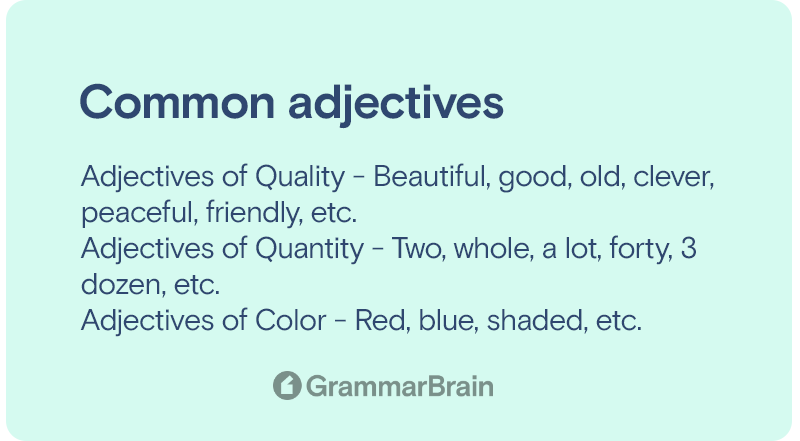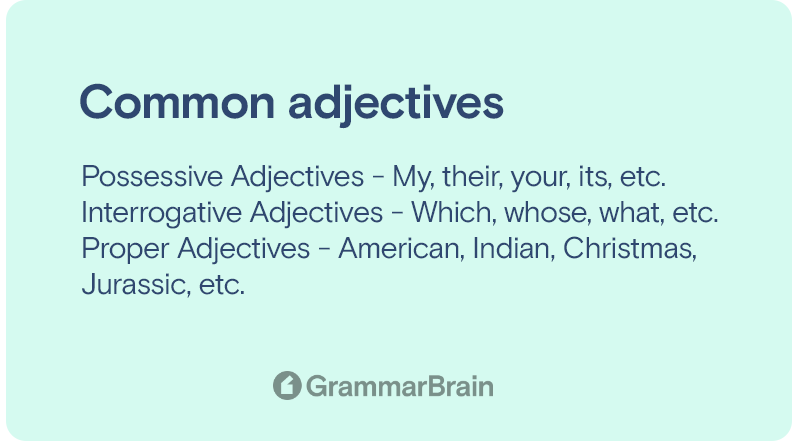What are common adjectives in American English? Adjectives account for some 20% of English word use. The English language has certain adjectives categorized into “common” and “proper,” and you may come across something like “common adjectives.”
What is a common adjective?
In English, some parts of speech can be classified as “common” and some as “proper.” This is true in the case of nouns. To understand the term “common adjective,” it is important to know what an adjective is. An adjective is any word that is used to describe a noun.
Consequently, common adjectives are words that may describe a person or thing. Intriguingly enough, the word “common” is a common adjective!

Common adjectives vs. proper adjectives
In the plainest terms, a common adjective is any adjective (describing word) that does not have a capital letter as its first letter.
Grammatically, adjectives that are not meant to get capitalized are referred to as common adjectives. Unless an adjective begins a sentence, it is not used with its beginning letter capitalized.
Consequently, all adjectives, or most of them, are common adjectives. The examples below show how common adjectives may be capitalized depending on sentence positions.
- Mary wore a beautiful gown of lace to the grand ball yesterday.
Here, the gown is described with the adjective “beautiful” and the ball as “grand.” The common adjective is in use in both positions here.
- Strong men are good in sports and other games.
Here, “strong” is not in the class of common adjectives as it is capitalized as it begins a sentence. Nonetheless, “good” is a common adjective due to its placement in the middle of the sentence.

When is an adjective a proper adjective?
Most of these adjectives in English speech and writing fall within the classification of common adjectives. As a result, the adjectives in use daily are common adjectives, such as those of color, quality, etc. The use of common adjectives is “very common.” Nevertheless, there is a concept in grammar as the proper adjective, distinguished from the standard counterpart.
So far, it is clear that the only time to capitalize an adjective is when it begins a sentence. Another rule of capitalization for adjectives is also present. This is when adjectives are “proper adjectives,” like proper nouns.
If an adjective is derived from a proper noun, the adjective will cease to be a common adjective. This derivation could be from someone’s name, like Shakespeare. Note the examples of adjectives no longer considered in the “common adjective” category:
- The play was a Shakespearean enactment of Julius Caesar.
- The British man walked with a slow step and a cane.
Here, both Shakespeare and British come from the names of men and countries, respectively. Consequently, they are proper adjectives and not common adjectives.
Examples of common adjectives
In grammatical terminology, common adjectives are words with qualified nouns and pronouns. The categories that fall within the broad class of common adjectives include (commonly) the following:
- Adjectives of Quality – Beautiful, good, old, clever, peaceful, friendly, etc.
- Adjectives of Quantity – Two, whole, a lot, forty, 3 dozen, etc.
- Adjectives of Color – Red, blue, shaded, etc.
- Demonstrative Adjectives – This, that, these, those, etc.
- Possessive Adjectives – My, their, your, its, etc.
- Interrogative Adjectives – Which, whose, what, etc.
- Proper Adjectives – American, Indian, Christmas, Jurassic, etc.
Examples of common adjectives in sentences
Here are some examples of sentences with a common adjective:
- This dress has become filthy after the walk in the park.
- She ordered four dozen oranges to make orange juice at home.
- I don’t think my mother will attend the party tonight.
- Which shirt did he buy: the black or the blue?
- The film depicted the Egyptian era quite well.
List of Common Adjectives
| adorable | adventurous | aggressive |
| agreeable | alert | alive |
| amused | angry | annoyed |
| annoying | anxious | arrogant |
| ashamed | attractive | average |
| awful | bad | beautiful |
| better | bewildered | black |
| bloody | blue | blue-eyed |
| blushing | bored | brainy |
| brave | breakable | bright |
| busy | calm | careful |
| cautious | charming | cheerful |
| clean | clear | clever |
| cloudy | clumsy | colorful |
| combative | comfortable | concerned |
| condemned | confused | cooperative |
| courageous | crazy | creepy |
| crowded | cruel | curious |
| cute | dangerous | dark |
| dead | defeated | defiant |
| delightful | depressed | determined |
| different | difficult | disgusted |
| distinct | disturbed | dizzy |
| doubtful | drab | dull |
| eager | easy | elated |
| elegant | embarrassed | enchanting |
| encouraging | energetic | enthusiastic |
| envious | evil | excited |
| expensive | exuberant | fair |
| faithful | famous | fancy |
| fantastic | fierce | filthy |
| fine | foolish | fragile |
| frail | frantic | friendly |
| frightened | funny | gentle |
| gifted | glamorous | gleaming |
| glorious | good | gorgeous |
| graceful | grieving | grotesque |
| grumpy | handsome | happy |
| healthy | helpful | helpless |
| hilarious | homeless | homely |
| horrible | hungry | hurt |
| ill | important | impossible |
| inexpensive | innocent | inquisitive |
| itchy | jealous | jittery |
| jolly | joyous | kind |
| lazy | light | lively |
| lonely | long | lovely |
| lucky | magnificent | misty |
| modern | motionless | muddy |
| mushy | mysterious | nasty |
| naughty | nervous | nice |
| nutty | obedient | obnoxious |
| odd | old-fashioned | open |
| outrageous | outstanding | panicky |
| perfect | plain | pleasant |
| poised | poor | powerful |
| precious | prickly | proud |
| putrid | puzzled | quaint |
| real | relieved | repulsive |
| rich | scary | selfish |
| shiny | shy | silly |
| sleepy | smiling | smoggy |
| sore | sparkling | splendid |
| spotless | stormy | strange |
| stupid | successful | super |
| talented | tame | tasty |
| tender | tense | terrible |
| thankful | thoughtful | thoughtless |
| tired | tough | troubled |
| ugliest | ugly | uninterested |
| unsightly | unusual | upset |
| uptight | vast | victorious |
| vivacious | wandering | weary |
| wicked | wide-eyed | wild |
| witty | worried | worrisome |
| wrong | zany | zealous |
Conclusion
Common adjectives occur almost everywhere in the English language. They are essential in describing words and make any text more engaging, especially in describing an event or characters in a story. Their use is widespread, and it is crucial to know several of these words to communicate effectively.
FAQs
1. What is a common adjective?
A common adjective is merely a word used to describe a sentence’s subject. Any word that describes a noun is a common adjective.
2. When is an adjective a proper adjective?
An adjective becomes a proper adjective when used to describe a noun but is related to a proper noun. For e.g., the American soldier. The soldier is described as “American.”
Inside this article
Fact checked:
Content is rigorously reviewed by a team of qualified and experienced fact checkers. Fact checkers review articles for factual accuracy, relevance, and timeliness. Learn more.
Core lessons
Glossary
- Abstract Noun
- Accusative Case
- Anecdote
- Antonym
- Active Sentence
- Adverb
- Adjective
- Allegory
- Alliteration
- Adjective Clause
- Adjective Phrase
- Ampersand
- Anastrophe
- Adverbial Clause
- Appositive Phrase
- Clause
- Compound Adjective
- Complex Sentence
- Compound Words
- Compound Predicate
- Common Noun
- Comparative Adjective
- Comparative and Superlative
- Compound Noun
- Compound Subject
- Compound Sentence
- Copular Verb
- Collective Noun
- Colloquialism
- Conciseness
- Consonance
- Conditional
- Concrete Noun
- Conjunction
- Conjugation
- Conditional Sentence
- Comma Splice
- Correlative Conjunction
- Coordinating Conjunction
- Coordinate Adjective
- Cumulative Adjective
- Dative Case
- Determiner
- Declarative Sentence
- Declarative Statement
- Direct Object Pronoun
- Direct Object
- Diction
- Diphthong
- Dangling Modifier
- Demonstrative Pronoun
- Demonstrative Adjective
- Direct Characterization
- Definite Article
- Doublespeak
- False Dilemma Fallacy
- Future Perfect Progressive
- Future Simple
- Future Perfect Continuous
- Future Perfect
- First Conditional
- Irregular Adjective
- Irregular Verb
- Imperative Sentence
- Indefinite Article
- Intransitive Verb
- Introductory Phrase
- Indefinite Pronoun
- Indirect Characterization
- Interrogative Sentence
- Intensive Pronoun
- Inanimate Object
- Indefinite Tense
- Infinitive Phrase
- Interjection
- Intensifier
- Infinitive
- Indicative Mood
- Participle
- Parallelism
- Prepositional Phrase
- Past Simple Tense
- Past Continuous Tense
- Past Perfect Tense
- Past Progressive Tense
- Present Simple Tense
- Present Perfect Tense
- Personal Pronoun
- Personification
- Persuasive Writing
- Parallel Structure
- Phrasal Verb
- Predicate Adjective
- Predicate Nominative
- Phonetic Language
- Plural Noun
- Punctuation
- Punctuation Marks
- Preposition
- Preposition of Place
- Parts of Speech
- Possessive Adjective
- Possessive Determiner
- Possessive Case
- Possessive Noun
- Proper Adjective
- Proper Noun
- Present Participle
- Prefix
- Predicate



